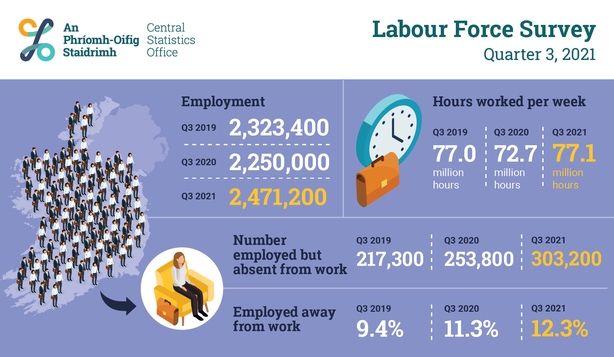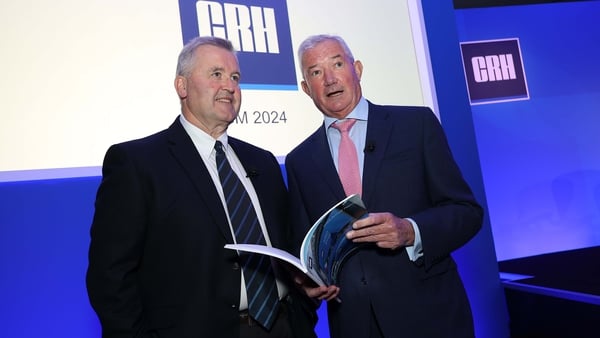Absences from work due to factors such as temporary layoffs, illness, family leave and holidays were up nearly 20% in the year to the end of September, new figures from the Central Statistics Office show today.
In total, 303,200 people - or 12.3% of the workforce - were absent from work during the third quarter.
This is up from 11.3% or 253,800 in the same period last year, reflecting an increase in illness but also people taking holidays later than during the normal summer period.
However, the latest Labour Force Survey found that there was also a 9.8% increase in employment during the three month period to 2.471m.
The two factors together resulted in an increase of 6% or 4.3 million additional hours being worked a week between July and the end of September, the survey found.
That brought the number of hours worked per week in the year to the end of September to 77.1 million, a slight rise compared to the 77 million hours in the same period in 2019, prior to the Covid-19 pandemic hitting.
The CSO said that by the end of September, the Covid-19 Adjusted Measure of Employment is estimated to have been 2,369,731 or 69.1%.
However, by the end of October 2021, it is estimated that this had risen slightly further to 69.8%.
149,100 people were classified as being unemployed in the third quarter of the year, giving an unemployment rate of 5.7%.
However, when those out of work due to Covid-19 related absences are included, the Covid-19 Adjusted Unemployment Rate came in at 8.9%.
By the end of October, though, that is estimated to have fallen to 7.9%, reflecting the return to work for many across a number of sectors that had faced Covid-19 restrictions.
"The Covid-19 pandemic is continuing to have a considerable impact on the Irish labour market and that impact was first felt at the end of Quarter 1 2021," said Jim Dalton, Statistician at the CSO.

The CSO found that employment rose across all sectors in the economy during the third quarter.
Accommodation & Food Service saw the biggest increase of 28.7% or 39,400 in employment, while there was a 17.3% increase in the Professional, Scientific & Technical activities sector.
The number of hours worked per week were higher than a year ago in nearly all sectors of the economy and were close to levels seen in 2019.
Accommodation & Food Services sector saw an increase of 32.4%, reflecting the lifting of restrictions.
Commenting on today's CSO figures, the Minister for Finance said they were very encouraging and consistent with other recent indicators, including the 170,000 fall in PUP numbers in the third quarter and the ongoing strength of income tax receipts this year.
"This confirms that the Government's policy response to the pandemic has been appropriate - minimising scarring and paving the way for rapid recovery," Paschal Donohoe said.
"I am confident that, once we overcome the fourth wave of the virus, our economy and our jobs market will continue to strengthen," he added.
Tánaiste and Minister for Enterprise, Trade and Employment, Leo Varadkar, said that employment is now approaching the 2.5 million target set for 2024 in the Government's Economic Recovery Plan, higher than it was before Covid.
"The virus never ceases to surprise us and the past few weeks have given rise to more uncertainty. I know this is really tough for businesses and staff," Mr Varadkar said.
"We are monitoring the situation closely and the Government will continue to be there for those that are struggling. The fact that so many people were able to return to work relatively quickly is a testament to the policies that are in place to help businesses with their overheads and maintaining contact with their staff," he added.






